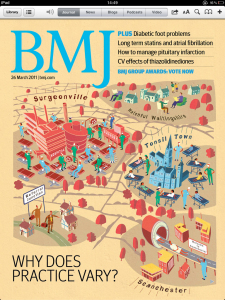A chunk of our working week is now devoted to preparing the latest BMJ iPad edition so its appearance in the iTunes app store coincides with the thud of the print issue as it lands on subscribers’ mats. I thought I’d use this blog to explain how our processes have changed to accommodate our new product, and to gauge interest in seeing the BMJ on other e-reader/mobile devices.
 But first, some history. The BMJ iPad app launched in early 2011. We are the first general medical journal on Apple’s tablet computer, and our focus was to respond to a wish from some international subscribers to get a sense of what the print issue looks like each week.We’ve been delighted with the feedback to date, particularly with the interest shown by BMA members. When we developed the app we assumed (wrongly, as it turned out), that interest from UK doctors would be limited. After all, most get the BMJ print and online as a BMA membership benefit. So our focus was getting the app live, rather than investigating ways of offering it free to members. The BMA is now offering it for free. You can find out more by reading these FAQs.
But first, some history. The BMJ iPad app launched in early 2011. We are the first general medical journal on Apple’s tablet computer, and our focus was to respond to a wish from some international subscribers to get a sense of what the print issue looks like each week.We’ve been delighted with the feedback to date, particularly with the interest shown by BMA members. When we developed the app we assumed (wrongly, as it turned out), that interest from UK doctors would be limited. After all, most get the BMJ print and online as a BMA membership benefit. So our focus was getting the app live, rather than investigating ways of offering it free to members. The BMA is now offering it for free. You can find out more by reading these FAQs.
I’ve talked a lot about print, but our focus throughout was to make the app genuinely interactive, and it is this which takes up our time each week.
The print issue goes to press on Tuesdays, but many of the pages (research, practice, etc) are ready by Monday. So we meet to discuss what archive links to add to the iPad pages. These are the kind of connections we tend to make:
- If an article is already online it may have attracted some commments, so we often find an interesting one to link to,
- Other articles by the same author,
- Previous articles in a series,
- A relevant blog, podcast, or video,
- A discussion on doc2doc, BMJ Group’s global clinical community
On Wednesdays, after the print issue has gone to press, we select images for the iPad and ensure they are the right format and size for the device. We then insert all the links we identified on Monday via a content management system, and quality assure the finished product on a test server before getting the issue live by Friday. This usually entails ensuring that links work that images look OK. News, blogs, podcasts, and videos are updated via a live feed, so they bypass the above process, but an end users always sees the latest each time they log in via a web or wifi connection.
The whole process now runs pretty seamlessly, so I imagine we will very soon consider if we want the BMJ on other mobile/e-reader devices. The iPad project means we had to stall our discussions on iPhone apps, or ones for othe mobile platforms. How might we cut the content cake for a phone app? We could, for instance, launch separate ones for news, education, research, and comment. Or we could be more creative and combine content from across BMJ Group products, adopting a similar approach as we have for specialty portals (see my previous blog). Amazon’s Kindle often gets talked about. Perhaps that’s a logical next step for us. It would be great to get your feedback.
David Payne is editor, bmj.com


